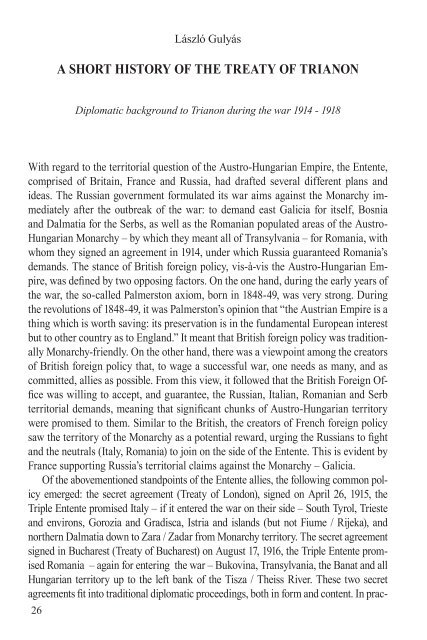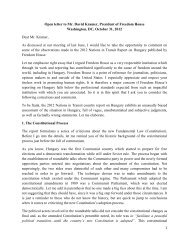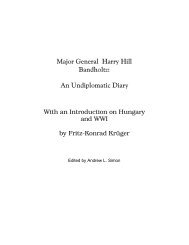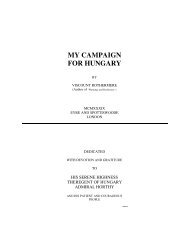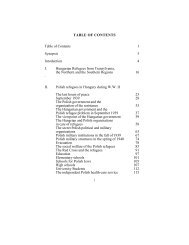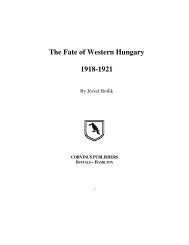Hungary and the Hungarians - Corvinus Library - Hungarian History
Hungary and the Hungarians - Corvinus Library - Hungarian History
Hungary and the Hungarians - Corvinus Library - Hungarian History
You also want an ePaper? Increase the reach of your titles
YUMPU automatically turns print PDFs into web optimized ePapers that Google loves.
26<br />
László gulyás<br />
A SHORT HISTORY OF THE TREATY OF TRIANON<br />
Diplomatic background to Trianon during <strong>the</strong> war 1914 - 1918<br />
With regard to <strong>the</strong> territorial question of <strong>the</strong> Austro-<strong>Hungarian</strong> Empire, <strong>the</strong> Entente,<br />
comprised of Britain, france <strong>and</strong> Russia, had drafted several different plans <strong>and</strong><br />
ideas. The Russian government formulated its war aims against <strong>the</strong> Monarchy immediately<br />
after <strong>the</strong> outbreak of <strong>the</strong> war: to dem<strong>and</strong> east galicia for itself, Bosnia<br />
<strong>and</strong> dalmatia for <strong>the</strong> Serbs, as well as <strong>the</strong> Romanian populated areas of <strong>the</strong> Austro-<br />
<strong>Hungarian</strong> Monarchy – by which <strong>the</strong>y meant all of Transylvania – for Romania, with<br />
whom <strong>the</strong>y signed an agreement in 1914, under which Russia guaranteed Romania’s<br />
dem<strong>and</strong>s. The stance of British foreign policy, vis-à-vis <strong>the</strong> Austro-<strong>Hungarian</strong> Empire,<br />
was defined by two opposing factors. On <strong>the</strong> one h<strong>and</strong>, during <strong>the</strong> early years of<br />
<strong>the</strong> war, <strong>the</strong> so-called Palmerston axiom, born in 1848-49, was very strong. during<br />
<strong>the</strong> revolutions of 1848-49, it was Palmerston’s opinion that “<strong>the</strong> Austrian Empire is a<br />
thing which is worth saving: its preservation is in <strong>the</strong> fundamental European interest<br />
but to o<strong>the</strong>r country as to Engl<strong>and</strong>.” It meant that British foreign policy was traditionally<br />
Monarchy-friendly. On <strong>the</strong> o<strong>the</strong>r h<strong>and</strong>, <strong>the</strong>re was a viewpoint among <strong>the</strong> creators<br />
of British foreign policy that, to wage a successful war, one needs as many, <strong>and</strong> as<br />
committed, allies as possible. from this view, it followed that <strong>the</strong> British foreign Office<br />
was willing to accept, <strong>and</strong> guarantee, <strong>the</strong> Russian, Italian, Romanian <strong>and</strong> Serb<br />
territorial dem<strong>and</strong>s, meaning that significant chunks of Austro-<strong>Hungarian</strong> territory<br />
were promised to <strong>the</strong>m. Similar to <strong>the</strong> British, <strong>the</strong> creators of french foreign policy<br />
saw <strong>the</strong> territory of <strong>the</strong> Monarchy as a potential reward, urging <strong>the</strong> Russians to fight<br />
<strong>and</strong> <strong>the</strong> neutrals (Italy, Romania) to join on <strong>the</strong> side of <strong>the</strong> Entente. This is evident by<br />
france supporting Russia’s territorial claims against <strong>the</strong> Monarchy – galicia.<br />
Of <strong>the</strong> abovementioned st<strong>and</strong>points of <strong>the</strong> Entente allies, <strong>the</strong> following common policy<br />
emerged: <strong>the</strong> secret agreement (Treaty of London), signed on April 26, 1915, <strong>the</strong><br />
Triple Entente promised Italy – if it entered <strong>the</strong> war on <strong>the</strong>ir side – South Tyrol, Trieste<br />
<strong>and</strong> environs, gorozia <strong>and</strong> gradisca, Istria <strong>and</strong> isl<strong>and</strong>s (but not fiume / Rijeka), <strong>and</strong><br />
nor<strong>the</strong>rn dalmatia down to Zara / Zadar from Monarchy territory. The secret agreement<br />
signed in Bucharest (Treaty of Bucharest) on August 17, 1916, <strong>the</strong> Triple Entente promised<br />
Romania – again for entering <strong>the</strong> war – Bukovina, Transylvania, <strong>the</strong> Banat <strong>and</strong> all<br />
<strong>Hungarian</strong> territory up to <strong>the</strong> left bank of <strong>the</strong> Tisza / Theiss River. These two secret<br />
agreements fit into traditional diplomatic proceedings, both in form <strong>and</strong> content. In prac-


